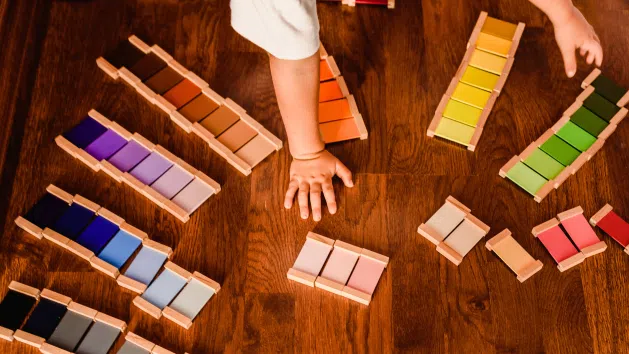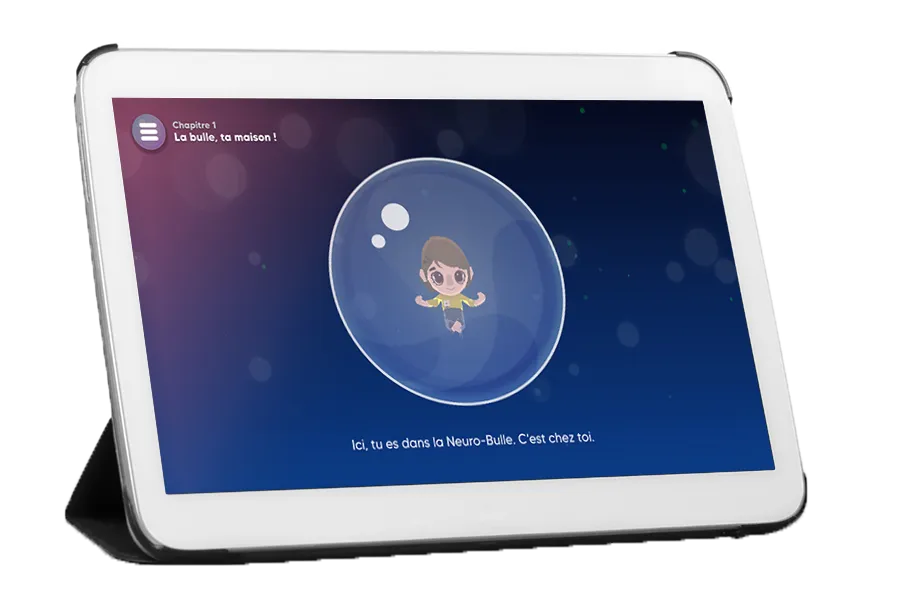The Montessori approach
Montessori pedagogy, founded by Maria Montessori in the early 20th century, is focused on child observation, curiosity and exploration. For the record, Maria Montessori, Italy’s first female medical graduate, initially worked with disabled children requiring special care. To alleviate their needs, she developed a unique teaching aid that would later bear her name. Later, her observations convinced her that her approach could be applied to all children. 🌈
The principles of Montessori pedagogy
In 1907, she opened the first Maison des Enfants in Rome, where she applied her educational principles. The results were astonishing: children showed increased concentration, a capacity for independent learning and accelerated development.
Today, there are some 400 Montessori schools in France, offering children an education based on respect, autonomy and discovery. Other schools incorporate the principles of Montessori’s pedagogy, such as the French the M school, a bilingual nursery school, or the Walt school, which supports neuro-atypical children with the help of specialists and therapists. In fact, you’ll spot students from the school in Léa Todorov’s film “La Nouvelle Femme”, which traces the life of Maria Montessori!
➡️ Want to know more? Check out our full article on Montessori pedagogy.
Freinet pedagogy
In the 1920s, after being wounded in the First World War, French pedagogue Célestin Freinet devised a new teaching method. Unable to continue teaching in the traditional way because of his health, he rethought education, focusing on children’s needs. Freinet develops a pedagogy focused on children’s freedom of expression and active learning that leads to the creation of the ICEM (Institut Coopératif de l’Ecole Moderne) in 1947.
The principles of Freinet pedagogy
Freinet was convinced that the child learns by being active and involved: “It is by walking that the child learns to walk; it is by speaking that he learns to speak; it is by drawing that he learns to draw.” Her method encourages children’s free expression through creative, hands-on workshops.
➡️ Want to find out more? Check out our full article on Freinet pedagogy.
The Decroly pedagogy
Ovide Decroly, a Belgian pedagogue and neuropsychiatrist, devoted part of his life to reforming teaching based on a more global approach to learning. In 1901, while running a clinic-laboratory for children with disorders, he observed the importance of taking into account the child’s overall development. He then applied these principles to create an innovative teaching method, based on observation and engaging children in their own learning. 🧠
The principles of Decroly pedagogy
Decroly insists on using children’s interests as a starting point for their learning. He developed a method that solicits the child’s different functions: motor, sensory, intellectual and emotional. After founding the Decroly School in 1907, he expanded his work to include all children. The classroom is seen as a laboratory where pupils discover for themselves through observation and manipulation.
What’s the difference with a traditional school?
Montessori, Freinet and Decroly schools are generally non-contracted private schools, meaning they have not signed an agreement with the state. These schools are not obliged to follow the French Education Nationale curriculum. They are, however, inspected from their first year of operation, in particular to check that the teaching provided is aligned with the essential knowledge and skills that must be acquired by the end of compulsory schooling, set in France at age 16.
Babaoo Tip💡
We recommend watching the Canal+ documentary series “Le Bonheur à l’école” (“Happiness at school”), which highlights innovative educational approaches in several countries, from France to Switzerland to Germany.
A pedagogy accessible to all?
Tuition fees at alternative schools are generally high: from 6,000 to 30,000 euros a year. Financial aid is rare, apart from for certain scholarship students or as part of specific educational projects (sponsorship).
✏ Note: parents interested in alternative schools can discover the book “After the alternative school” by Innovation en éducation. It features feedback from former students of Montessori, Freinet, democratic and other schools. Useful for forming an opinion on the matter! 😊
Are alternative approaches reserved for alternative schools?
Alternative pedagogies share Maria Montessori’s idea that “the pupil is not a vase to be filled, but a source to be allowed to gush forth” ⛲.
Many teachers in “traditional” schools are inspired by the principles of alternative pedagogies and integrate them into their practice.
For example, approaches that come under the heading of active pedagogies, the principle of which is to make the student active in order to participate in the construction of what he or she learns, are also given prominence in school curricula, in the image, for example, of the investigative approach in science.
On the other hand, concepts such as “the flipped classroom” come close to alternative pedagogies in their desire to rethink the role of the teacher and student engagement. In this case, students study theory at home, at their own pace, and use class time for practical activities and discussions.
The Babaoo recap
As Benjamin Franklin once said, “Tell me and I’ll forget; teach me and I’ll remember; involve me and I’ll learn.”
When a student is asked to perform a task, he may not retain; if he is shown, he will understand better; and if he is directly involved, he will fully grasp the subject, understanding its usefulness and appropriating the knowledge. He builds this knowledge by doing.
Alternative pedagogies implement this principle by actively involving students in their own learning to foster a more personalized, interactive and meaningful education.





